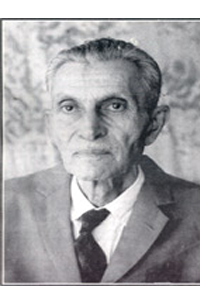J. K. Mehta
Appearance
The topic of this article may not meet Wikipedia's general notability guideline. (November 2021) |
J. K. Mehta | |
|---|---|
 | |
| Born | Jamshed Kaikhushro Mehta[1] 14 December 1901 |
| Died | 9 August 1980 (aged 78)[2] |
| Nationality | Indian |
| Alma mater | University of Allahabad (PhD) |
| Occupation | Economist[3] |
[4]Jamshed Kaikhusro Mehta, known professionally as J. K. Mehta (14 December 1901 – 9 August 1980) was an Indian philosopher and economist.[5]
Life and ideas
J. K. Mehta was born to K. M. Mehta in Rajnandgaon in 1901. He completed his graduation from Moir Central College and attended University of Allahabad for post-graduation studies.
Mehta is known for his idea of wantlessness, presenting in 1931 the theory of marginal revenue.[citation needed] He was much inspired by Mahatma Gandhi and spread his theory of economics.[6][7]
See also
University of Allahabad List of University of Allahabad alumni Makrana Marble
Main works
- Economics of Growth (1st ed., 1964)[8]
- "A Philosophical Interpretation of Economics"[9]
- Rhyme, Rhythm and Truth in Economics[10]
- The Elements of Economics Mathematically Interpreted, (1st ed., 1932)[11]
- Gandhian Thought[12]
References
- ^ "Remembering J.K.Mehta on his 34th Death Anniversary". Active India.
- ^ "Remembering J.K.Mehta on his 34th Death Anniversary". Active India.
- ^ "The Indian Journal of Economics - University of Allahabad". www.indianjournalofeconomics.com.
- ^ Shukla, D.K. (1 October 1963). "A Philosophical Interpretation of Economics By J.K. Mehta. George Allen & Unwin Ltd., London, 1962. 288p. 35s". India Quarterly. 19 (4): 410–411. doi:10.1177/097492846301900430. ISSN 0974-9284.
- ^ Mehta, J. K.; Jain, Prakash Chandra; Chaturvedi, D. N., eds. (1976). Essays in contemporary economics: in honour of professor J. K. Mehta. New Delhi: Vikas Pub. House. ISBN 978-0-7069-0409-3.
- ^ "ISBN 9780836413885 - Gandhian Thought". isbnsearch.org.
- ^ Economic ideas [1]
- ^ Mehta, J. K (1964). Economics of growth. Asia Pub. House. OCLC 13799094.
- ^ Macfie, A. L. (1963). "Review of A Philosophical Interpretation of Economics". The Economic Journal. 73 (289): 106–108. doi:10.2307/2228409. JSTOR 2228409.
- ^ Mehta, J. K (1967). Rhyme, rhythm and truth in economics. Asia Pub. House. OCLC 473963.
- ^ Reynard, H. (1933). "Review of The Elements of Economics". The Economic Journal. 43 (170): 321–322. doi:10.2307/2224486. ISSN 0013-0133.
- ^ "ISBN 9780836413885 - Gandhian Thought". isbnsearch.org.
